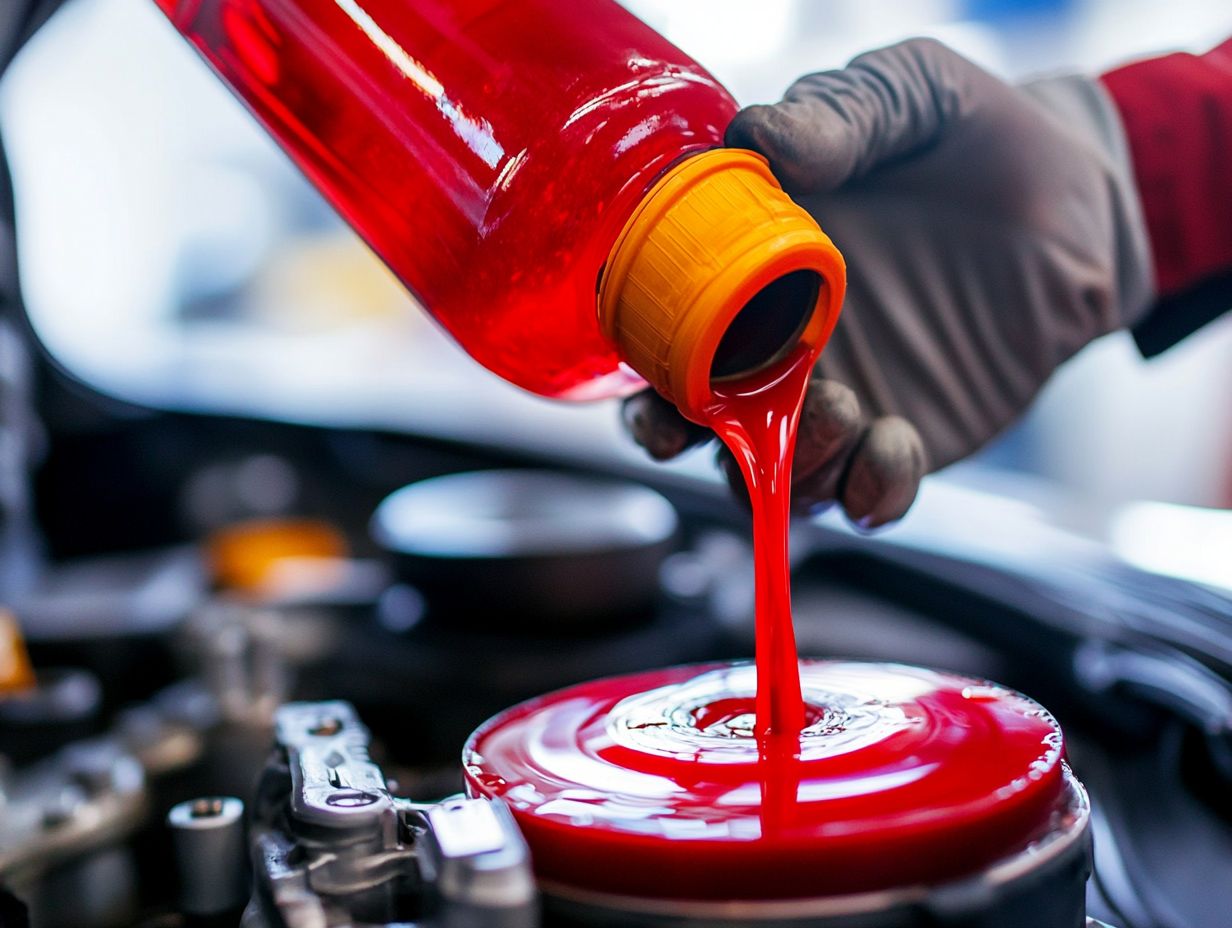The Benefits of Regular Transmission Fluid Changes
Transmission fluid is a vital element in your vehicle’s performance. It is essential for lubricating, cooling, and facilitating smooth gear transitions. Recognizing its significance can profoundly influence your car’s longevity and efficiency.
This article delves into the advantages of regular transmission fluid changes, highlights the telltale signs that indicate it s time for a change, and outlines the ideal frequency based on various vehicle types.
It also compares doing fluid changes yourself versus getting professional help, empowering you to make an informed choice for your car’s well-being.
Contents
- Key Takeaways:
- What is Transmission Fluid and Why is it Important?
- The Benefits of Regular Transmission Fluid Changes
- Signs that Your Transmission Fluid Needs to be Changed
- How Often Should You Change Your Transmission Fluid?
- DIY vs Professional Transmission Fluid Changes
- Frequently Asked Questions
- What are the benefits of regular transmission fluid changes?
- How often should I get a transmission fluid change?
- What happens if I don’t change my transmission fluid regularly?
- Can I change my transmission fluid myself?
- How much does a transmission fluid change cost?
- Will changing my transmission fluid improve my gas mileage?
Key Takeaways:

- Stay ahead! Regular transmission fluid changes boost your vehicle’s performance and prolong the lifespan of your transmission system.
- Watch for signs that your transmission fluid needs changing: strange noises, difficulty shifting gears, and dirty fluid.
- The recommended frequency for transmission fluid changes varies by vehicle type, but it s generally every 30,000 to 60,000 miles.
What is Transmission Fluid and Why is it Important?
Transmission fluid plays a crucial role in both automatic and manual transmission systems. It performs multiple functions essential for your vehicle’s maintenance and performance. It lubricates the transmission components and helps with cooling and cleaning.
This ensures that your gears operate smoothly and prevents wear and tear over time. The quality of your transmission fluid directly impacts engine performance and fuel economy, making it vital to recognize its importance and monitor those fluid levels.
Understanding the Role of Transmission Fluid
The primary role of transmission fluid is to serve as a lubricant for your transmission components. This ensures smooth shifts and extends the lifespan of your transmission system.
Beyond lubrication, this essential fluid also acts as a coolant. It dissipates heat generated from gear interactions and friction in both automatic and manual transmissions.
Maintaining the quality of this fluid is paramount. Old or dirty fluid can lead to increased wear and tear, putting your entire transmission unit at risk. Regular servicing, including checks and fluid replacements, is vital to preventing potential issues.
By following a consistent maintenance schedule, you can enhance your vehicle’s performance and improve fuel efficiency. This also significantly lowers the chances of costly repairs due to transmission malfunctions.
The Benefits of Regular Transmission Fluid Changes
Don’t wait! Regularly changing your transmission fluid is vital for preserving the health of your vehicle s transmission system. This enhances performance and longevity.
By keeping the transmission fluid clean and at optimal levels, you can enjoy improved fuel efficiency and minimize the risks of wear and tear on the transmission components. This proactive approach not only safeguards your investment but also contributes to a smoother driving experience.
Improved Performance and Longevity

Using high-quality transmission fluid can significantly enhance both the performance and longevity of your vehicle’s transmission system.
This premium fluid is essential for ensuring that your gears engage smoothly and operate efficiently. This helps minimize wear and tear on critical components. Choosing the right fluid helps maintain optimal operating temperatures and provides necessary lubrication that prevents friction-related damage.
Consequently, the risk of costly transmission failures is greatly reduced, leading to lower maintenance expenses throughout your vehicle’s lifespan.
Regular professional transmission servicing ensures the right fluid is used and allows for the early detection of potential issues. This proactive approach offers peace of mind and enhances the overall reliability of your vehicle.
Ready to check your transmission fluid? Don t hesitate to schedule a service today!
Signs that Your Transmission Fluid Needs to be Changed
Recognizing the signs that your transmission fluid requires a change is essential for maintaining your vehicle’s health. Ignoring this can result in serious transmission problems later on.
Look out for common indicators:
- A change in fluid color
- A burning smell
- Engine lock-up
- Strange sounds
- Slipping gears
- Irregular shifting
These are all red flags suggesting that the fluid may be contaminated or at dangerously low levels. Staying vigilant will help you avoid costly repairs and keep your vehicle running smoothly.
Common Red Flags
Several red flags may indicate that your transmission fluid needs immediate attention. Symptoms like grinding or whining sounds while driving might suggest that your gears are worn out or there s internal damage. A delay when changing gears could be a sign that your fluid is dirty and not circulating effectively.
Recognizing these signs early and addressing them promptly can save you from costly repairs and extensive wear on crucial transmission components. Changing your fluid regularly keeps your transmission running smoothly and helps it last longer.
How Often Should You Change Your Transmission Fluid?
The frequency with which you should change your transmission fluid depends on several factors, including whether your transmission is automatic or manual, your driving habits, and your vehicle s maintenance schedule.
While some manufacturers suggest changing it every 30,000 to 60,000 miles, regular check-ups are crucial for maintaining the best condition of your transmission.
Recommended Frequency for Different Vehicles

Different vehicles come with unique recommendations for how often you should change your transmission fluid, influenced by your driving habits and the type of vehicle you own.
For example, if you drive an automatic transmission vehicle, consider changing your fluid every 30,000 to 60,000 miles. On the other hand, if you have a manual transmission, it could be more like every 40,000 to 80,000 miles. Be aware that aggressive driving, frequent stop-and-go traffic, or towing heavy loads could mean you need to change that fluid more often.
Check your owner’s manual for specific guidelines. Taking care of this maintenance not only boosts your vehicle’s performance but also extends the life of your transmission, ensuring you get the most out of your investment.
DIY vs Professional Transmission Fluid Changes
When considering a change in transmission fluid, you often find yourself weighing the options between DIY methods and professional transmission servicing, each presenting its own set of advantages and drawbacks.
You might be tempted by the cost-saving allure of a DIY approach, relishing the hands-on experience. However, you may also appreciate the peace of mind that comes from entrusting your vehicle to the expertise of seasoned transmission technicians, ensuring that your car performs at its best.
Pros and Cons of Each Option
The advantages of undertaking a DIY transmission fluid change include significant cost savings and the convenience of managing the task right at home. However, be aware that the downsides often involve the potential for mishandling the fluid or lacking the necessary expertise.
Conversely, opting for a professional service might mean facing higher upfront costs, but it usually results in a more efficient and comprehensive job. Professionals come equipped with the right tools and expertise to ensure that the fluid is handled safely and disposed of properly, thereby minimizing contamination risks.
Moreover, they can offer valuable insights into the overall health of your vehicle’s transmission system, potentially saving you money in the long run by addressing issues before they escalate. Ultimately, striking a balance between these considerations is essential for effective vehicle maintenance.
Final Thoughts and Recommendations
Ultimately, making informed decisions about transmission fluid changes is essential for optimal vehicle maintenance and performance.
Regularly checking and refreshing your transmission fluid can significantly extend the life of your vehicle’s transmission system. This system is often one of the most expensive components to repair or replace.
As a vehicle owner, understanding your manufacturer s guidelines regarding fluid change intervals is crucial. Neglecting this maintenance task can lead to overheating and eventual failure, which nobody wants to deal with.
Consider factors like your driving habits, the environment, and the age of your vehicle when deciding how often to change the fluid. While you might be tempted to take on this task yourself, consulting a professional mechanic can provide peace of mind that it s done correctly.
Prioritizing regular maintenance enhances your vehicle’s reliability and can save you from unexpected and costly automotive repairs down the road.
Don’t wait for a problem to arise check your transmission fluid today!
Frequently Asked Questions

What are the benefits of regular transmission fluid changes?
Regular transmission fluid changes can improve your vehicle’s overall performance and lifespan. Understanding the importance of regular fluid changes helps maintain smooth gear shifting, prevents transmission damage, and increases fuel efficiency.
How often should I get a transmission fluid change?
It is recommended to change your transmission fluid every 30,000 to 60,000 miles or as specified by your vehicle’s manufacturer. However, if you frequently drive in severe conditions, you may need to change it more often.
What happens if I don’t change my transmission fluid regularly?
If you neglect to change your transmission fluid regularly, dirt and debris can build up, causing damage to the transmission system. This can result in expensive repairs or even a complete transmission failure.
Can I change my transmission fluid myself?
While it is possible to change your transmission fluid yourself, it is not recommended unless you have the proper knowledge and experience. This process requires specialized equipment and can be dangerous if not done correctly.
How much does a transmission fluid change cost?
The cost of a transmission fluid change can vary depending on the type of vehicle, the transmission fluid used, and the location where you get it done. On average, it can range from $80 to $250.
Will changing my transmission fluid improve my gas mileage?
Yes, regular transmission fluid changes can improve your gas mileage. As the transmission fluid gets older and dirty, it can cause the transmission to work harder, leading to decreased fuel efficiency. Fresh transmission fluid helps maintain smooth gear shifting, which can enhance gas mileage.





